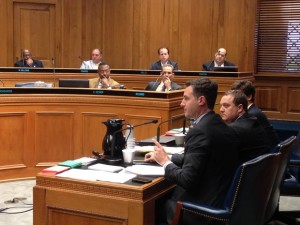 On Sunday, February 14th, the Louisiana Legislature commenced the first extraordinary legislative session. It will be over in three weeks. Then, less than a week later, the regular session will begin. With a new governor at the helm, and all of the political posturing taking place, this year’s session is sure to be interesting. I thought it would be a good time to talk about advocating. I’m going to talk briefly about advocating, in general, and explain the legislative process, then explain a little further from the position of a teacher and the position of a parent/community member.
On Sunday, February 14th, the Louisiana Legislature commenced the first extraordinary legislative session. It will be over in three weeks. Then, less than a week later, the regular session will begin. With a new governor at the helm, and all of the political posturing taking place, this year’s session is sure to be interesting. I thought it would be a good time to talk about advocating. I’m going to talk briefly about advocating, in general, and explain the legislative process, then explain a little further from the position of a teacher and the position of a parent/community member.
In a nutshell, bills are filed by legislators in their respective legislative bodies; either the Senate, or the House. The Senate President, and the Speaker of the House then assign the bills to be heard by the appropriate committee that the bill relates to. During committee meetings, the legislators are afforded the opportunity to discuss the bills and research their impact, and the authors of the bills are able to present their purpose for submitting the bill and provide supportive testimony. It is also the time when the public is allowed to speak on the bill in question. Public attendees are asked to fill out a green card if they wish to speak in favor of the bill, or a red card if opposed. Often times, there will professional lobbyist in attendance to support or oppose a bill. While lobbyists are required to follow certain lobbying rules, a lobbyist is not required to register as a lobbyist; nor are they required to wear a badge. The more “high profile” lobbyist do register and wear a badge, but more often than not, it is hard to distinguish a lobbyist from a regular public attendee; unless you are very involved in the process. Once a bill gets through a committee, it goes to the full legislative body for vote. If it passes, it then goes to the other body for a vote. If it passes both bodies, IT BECOMES LAW. There are exceptions to that, but I’ll save that for another blog.

What is important to understand about this process is that very often the only input (source of information) that legislators get prior to voting comes from a lobbyist who is paid to support, or oppose, the bill. If members of the general public do not express their thoughts on the bill, then legislators tend to vote based on the information provided. Unless the legislators are self-motivated to research the topic on their own, the outcome is usually in favor of the interest group that paid the lobbyist.
Advocating effectively takes a tremendous amount of time, research and commitment, but when successful, it is very rewarding. The committee meetings are the advocate’s best opportunity to influence the outcome of a bill. If a bill gets through a committee, and to the legislative body as a whole, your chances of communicating your concerns to every voting member are very slim.
TEACHERS
Being an educator, I have witnessed the following scenario, year after year. It is the first days of returning to school after summer break; typically inservice days. Teachers are gathered around visiting, catching up and trading vacation stories. The day gets called to order, and the mumbling begins…”Oh lawd! Let’s see what’s they changed, this year?”…”How will they screw the teachers, this time?”…”Yada, yada, yada…”

Let me say, first, that it is okay to be discontent with policy changes. It is also okay to voice your discontent with policy changes and newly enacted laws. This is a right that was reaffirmed by former Louisiana Governor, Bobby Jindal, on October 8, 2014, when he issued Executive Order BJ-14-12 which guaranteed teachers the right to freedom of speech. Executive orders issued by a seated governor stay in effect after leaving office, unless another governor rescinds the order, so feel free to vocalize your concerns and/or discontent, but please do so in a respectful and professional manner. It does no one any good to be a rogue, or a loose canon. I want to point out that if you begin your fight after bad policy/legislation is passed, or the first day back to school when you hear about it, your chances of effecting change and remaining respectful/professional are greatly reduced. Why? Because administrators above you are faced with the decision to follow policy or jeopardize their jobs. There will be some who agree with you, and some who don’t. If you are lucky, and all of your administrative personnel from principals up to the superintendent are knowledgeable and experienced, they will oppose the policy, as well, but know this…these days, that is rare. The time to be most effective is during the legislative process…BEFORE the bills are passed and the law is enacted.
Teachers, if you are okay with a policy, but a co-worker is voicing their opposition, it is not okay to run to an administrator to say that they are creating a negative environment. Unless your coworker is disrupting daily routine, or provoking arguments with coworkers, you are likely going to begin a chain of actions attempting to prohibit someone from exercising their right. In many cases, it is probably a good idea to listen to what they have to say. It might be that you just don’t know enough about the issue.
How do you get involved? First, do your research. Be knowledgeable. Be aware of events that are taking place. There will soon be a calendar available on this blog that will provide dates for scheduled committee meetings. Plan to participate. The possibility exists that you may be forced to take a day off to attend a meeting. Some districts distinguish between “personal days” and “sick days,” and they monitor them closely. Some districts do not monitor. Still, some districts just lump all days into “personal time off,” or PTO. If a district is supportive of your effort, you may even be able to avoid using your own days off and get a day for professional development. I assert that participating in the legislative process that directly affects education requires professionalism and certainly qualifies as “professional development.”
What is important is that you do not allow anyone to criticize you for taking a day away from your students to attend a committee meeting. Whether you are attending a committee meeting, or taking a day-cation, or sick, those days are yours to take. Some will say that you are only concerned about yourself and not your students. Remember, it is easy for them to criticize a teacher in that way, and if you listen to them, you will have no voice in the legislature. The fact is, you are doing it because you care about how it affects you AND your students.
PARENTS/COMMUNITY MEMBERS
 If you are a parent who has concerns about policy/legislation, then the first that you should do is meet with your school’s administrator to discuss your concern. Understand that if you are doing this after the fact, as I mentioned in the teacher section, you aren’t likely to get the responses you are looking for. In most cases, an administrator will just say it is beyond their control, and they have to follow the policy. Occasionally, you might find an administrator who agrees with your concerns, or you may know them well enough for them to share their concerns with you, in confidence; however, if that is the case, then they were likely expressing their concerns during the legislative process. Again, that is the most effective time to get involved. It is a good starting point to know where your administrator stands on the issue. In return, they know where you stand. Never forgot that as a parent, you are the final decision maker when it comes to your child in public school.
If you are a parent who has concerns about policy/legislation, then the first that you should do is meet with your school’s administrator to discuss your concern. Understand that if you are doing this after the fact, as I mentioned in the teacher section, you aren’t likely to get the responses you are looking for. In most cases, an administrator will just say it is beyond their control, and they have to follow the policy. Occasionally, you might find an administrator who agrees with your concerns, or you may know them well enough for them to share their concerns with you, in confidence; however, if that is the case, then they were likely expressing their concerns during the legislative process. Again, that is the most effective time to get involved. It is a good starting point to know where your administrator stands on the issue. In return, they know where you stand. Never forgot that as a parent, you are the final decision maker when it comes to your child in public school.
Discuss your concerns with other parents in your school and your neighbors. If they are uninformed, educate them. If they don’t care, don’t wast your time. Find those who do care. Research the issue and keep yourself informed. It is of the utmost importance that you know what and how policy will affect your child.
SUMMARY
I understand that many folks are too timid to speak in public, or don’t have the confidence in their knowledge. That is okay. You can still be effective. If you join groups, or follow blogs, there’s always opportunity to participate via email. Often times, a form letter is provided. You can use the form letter if you don’t know what to say. Obviously, I want to encourage everyone to actively participate in person, and I know that some can’t, but if you want to, here is the best way to do it.
 Get to know the Senators and Representatives who represent you in the legislature. They are far more likely to listen to and consider the concerns of the people they represent, if they know them. Read their profiles. Remember their faces. If you see them in public, introduce yourself. Introduce yourself via email. When you speak at a committee meeting, and your legislator is a committee member, indicate that when you speak. Let them put a face with your name. On the resource page of this blog, you will find links to email the education committees and all of the members of both legislative bodies. There will also soon be links and descriptions to various valuable blogs that pertain to education both in Louisiana and nationally.
Get to know the Senators and Representatives who represent you in the legislature. They are far more likely to listen to and consider the concerns of the people they represent, if they know them. Read their profiles. Remember their faces. If you see them in public, introduce yourself. Introduce yourself via email. When you speak at a committee meeting, and your legislator is a committee member, indicate that when you speak. Let them put a face with your name. On the resource page of this blog, you will find links to email the education committees and all of the members of both legislative bodies. There will also soon be links and descriptions to various valuable blogs that pertain to education both in Louisiana and nationally.
Communicate. Communicate. Communicate.
While it is true that the squeaky wheel gets the grease, we must understand that the person providing the grease often tells them which wheel to grease; therefore, you have to be vigilant to the point that your squeak can’t be ignored.

